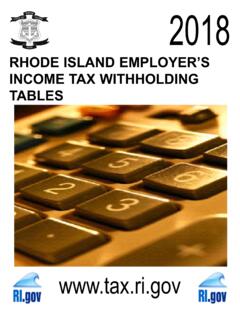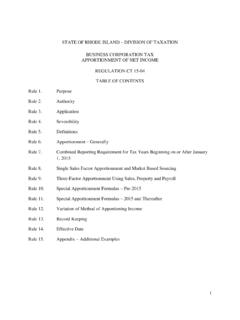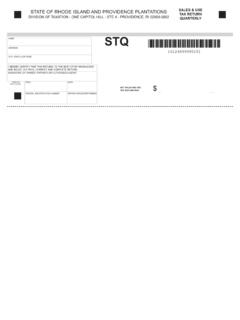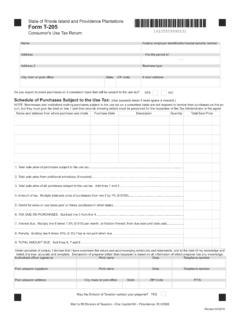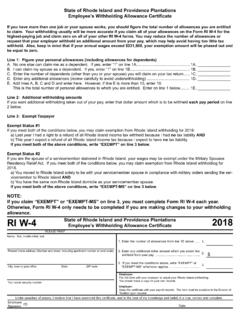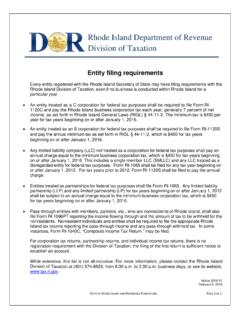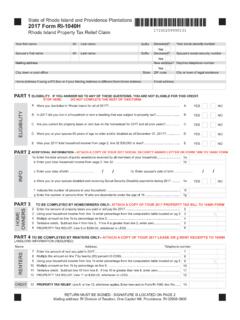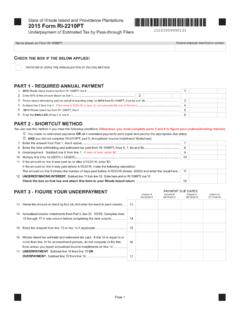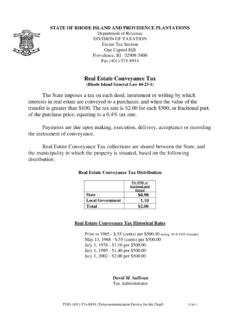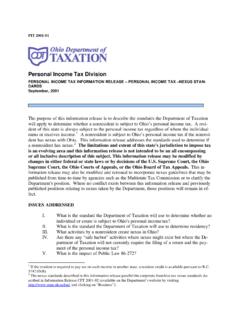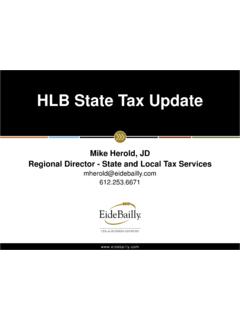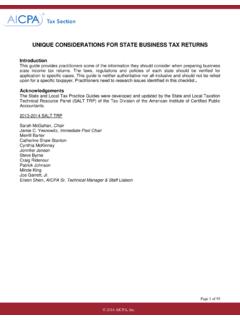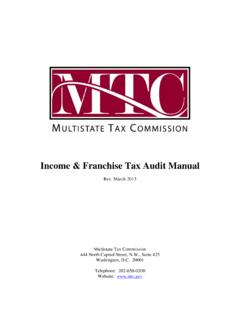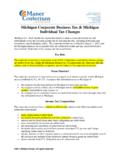Transcription of STATE OF RHODE ISLAND Corporate Nexus …
1 1 STATE OF RHODE ISLAND DIVISION OF TAXATION Business Corporation Tax Corporate Nexus Regulation CT 15-02 Table of Contents Rule 1. Purpose Rule 2. Authority Rule 3. Application Rule 4. Severability Rule 5. Definitions Rule 6. Nexus Generally Rule 7. Corporations Subject to Taxation Generally Rule 8. Combined Reporting Requirement for C corporations and Combined Groups Factor-Based Nexus Approach for Tax Years Beginning on or after January 1, 2015. Rule 9. Public Law 86-272 Solicitation Defined; Protected Activities Rule 10. Activities that Create Nexus Rule 11. Effective Date 2 Rule 1. Purpose These rules and regulations implement RIGL 44-11-1, 44-11-2, , 44-11-14, and other sections within Chapter 44-11 of the RHODE ISLAND General Laws.
2 These sections allow taxation of net income from businesses within and partially within the STATE . Rule 2. Authority These rules and regulations are promulgated pursuant to RIGL 44-1-4, which authorizes and empowers the RHODE ISLAND tax administrator to make rules and regulations, as the administrator may deem necessary for the proper administration and enforcement of the tax laws of this STATE . The rules and regulations have been prepared in accordance with the requirements of RIGL 42-35-1 et seq. of the RHODE ISLAND Administrative Procedures Act. Rule 3. Application These rules and regulations shall be liberally construed so as to permit the Division of Taxation the authority to effectuate the purpose of RIGL 44-11-1, 44-11-2, , 44-11-14, and other applicable RHODE ISLAND STATE laws and regulations.
3 Rule 4. Severability If any provision of these rules and regulations, or the application thereof to any person or circumstances, is held invalid by a court of competent jurisdiction, the validity of the remainder of the rules and regulations shall not be affected thereby. Rule 5. Definitions Combined Group means a group of two or more corporations in which more than fifty percent (50%) of the voting stock of each member corporation is directly or indirectly owned by a common owner or owners, either Corporate or non- Corporate , or by one or more of the member corporations, and that are engaged in a unitary business. Corporation has the meaning set forth in RIGL 44-11-1(4), and includes an LLC, partnership or other entity electing to be taxed as a corporation for federal tax purposes.
4 When a partnership or other pass-through entity is directly or indirectly held by a corporation, the business conducted by such a partnership or pass-through entity is considered the business of the corporation to the extent of the corporation s distributive share of the partnership or pass-through entity net income. Foreign Corporation means a corporation not organized under the laws of RHODE ISLAND . 3 General Partner has the meaning set forth in RIGL 7-13-1(7), as amended. Income encompasses both profits and losses, whether active or passive. Limited Partner has the meaning set forth in RIGL 7-13-1(8), as amended. Nexus means a connection or link with the STATE sufficient to subject a person to tax by the STATE , as described in Rule 6 of this Regulation. Office means a permanent or temporary location where any person or other entity makes sales or holds itself out to the public as conducting a business.
5 An in-home office of a sales representative is generally not considered an office of a corporation for purposes of this regulation, provided that the representative does not hold himself out as doing business on behalf of the corporation at that location by either publishing the home address or phone number as a Corporate business address or phone number or through other actions. Partnership has the meaning set forth in RIGL 7-12-17, as amended. Rule 6. Nexus Generally (a) Establishing Nexus generally means that a business has sufficient connection or presence in RHODE ISLAND for the STATE to have taxing authority. A foreign corporation is subject to RHODE ISLAND Corporate income tax if it conducts business activity in RHODE ISLAND and has income properly apportionable to RHODE ISLAND pursuant to RIGL 44-11-14, et seq.
6 , regardless of whether it is authorized to do business in RHODE ISLAND . The STATE Tax Administrator construes RHODE ISLAND law to assert the tax jurisdiction of RHODE ISLAND to the fullest extent permitted by the United States Constitution and the laws of the United States. Some type of physical or economic presence is necessary to establish Nexus with the STATE . The United States Constitution places limitations on a STATE s jurisdiction to tax. These constitutional limitations derive from two clauses in the United States Constitution: the Due Process Clause, in Amend. XIV, Section 1; and the Commerce Clause, in Art. 1, Section 8, cl. 3. The Nexus requirement of both clauses must be satisfied before an out-of- STATE business may be subject to the taxing jurisdiction of a STATE . (1) Due Process Clause Nexus is satisfied when a person has minimum contacts with a STATE such that maintenance of a lawsuit against the person would not offend traditional notions of fair play and substantial justice.
7 Due process clause Nexus is satisfied when the person has a physical presence in the STATE , but physical presence is not always necessary to establish Due Process Clause Nexus . Even without physical presence in the taxing STATE , Due Process Clause Nexus is satisfied when an out-of- STATE commercial actor s efforts are purposefully directed toward residents of the taxing STATE . (2) A STATE tax satisfies the Commerce Clause if it meets the following four requirements: the tax is applied to an activity with a substantial Nexus with the taxing STATE , the tax 4 is fairly apportioned, the tax does not discriminate against interstate commerce, and the tax is fairly related to services provided by the STATE . The Commerce Clause Nexus requirement limits the reach of STATE taxing authority so as to ensure that STATE taxation does not unduly burden interstate commerce.
8 The Commerce Clause substantial Nexus requirement is not satisfied when the only contacts of a vendor of tangible goods with the taxing STATE are by mail or common carrier. However, in the area of Corporate income taxation, the substantial Nexus requirement can be satisfied through a showing of significant economic presence, absent any finding of physical presence. Significant economic presence can be demonstrated through activities such as the solicitation of orders for services and intangibles by in- STATE residents, and through the provision of significant services and intangibles to in- STATE residents. (b) Federal statutory law places additional limits on a STATE s ability to tax interstate commerce. Section 101 of Public Law 86-272, codified at 15 381-384, prohibits a STATE from taxing the income of a foreign corporation whose only business activities within the STATE consist of solicitation of orders for tangible personal property, provided that the orders are sent outside the STATE for approval or rejection and the tangible personal property is shipped or delivered from out of STATE .
9 The leasing, renting, licensing or other disposition of tangible personal property, or transactions involving intangibles, such as franchises, patents, copyrights, trademarks, service marks and the like, are not protected under the act. Also, solicitation, sale, or performance of any type of services is not protected under the act unless entirely ancillary to facilitate the request for an order for the sale of tangible personal property. Corporations incorporated within RHODE ISLAND have physical presence in RHODE ISLAND . For more detailed guidance regarding interpretation of Public Law 86-272, including what activities constitute solicitation, what activities constitute activities ancillary to solicitation, what activities are protected, and what activities are unprotected, refer to Rule 9 of this Regulation.
10 Rule 7. Corporations Subject to Taxation Generally (a) General Nexus standards require the physical presence or economic presence of the taxpayer within the STATE for the taxpayer to be subject to taxation by the STATE . (b) The term corporation is defined in RIGL 44-11-1(4) to include various entities that are deriving any income from sources within the STATE or engaging in any activities or transactions within this STATE for the purposes of profit or gain, whether or not an office or place of business is maintained in this STATE , or whether or not such income, activities or transactions are connected with intrastate, interstate, or foreign commerce, subject to certain limitations. Correspondingly, RIGL 44-11-2 subjects such corporations to an income tax by the STATE of RHODE ISLAND .
